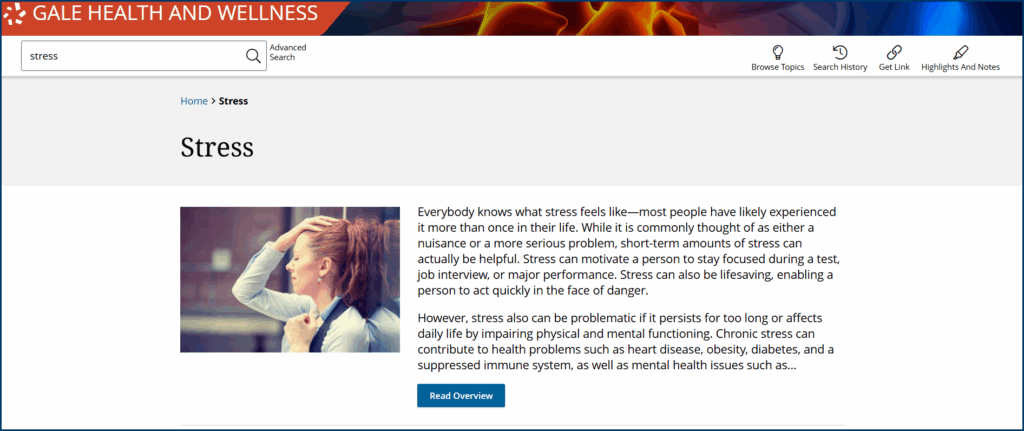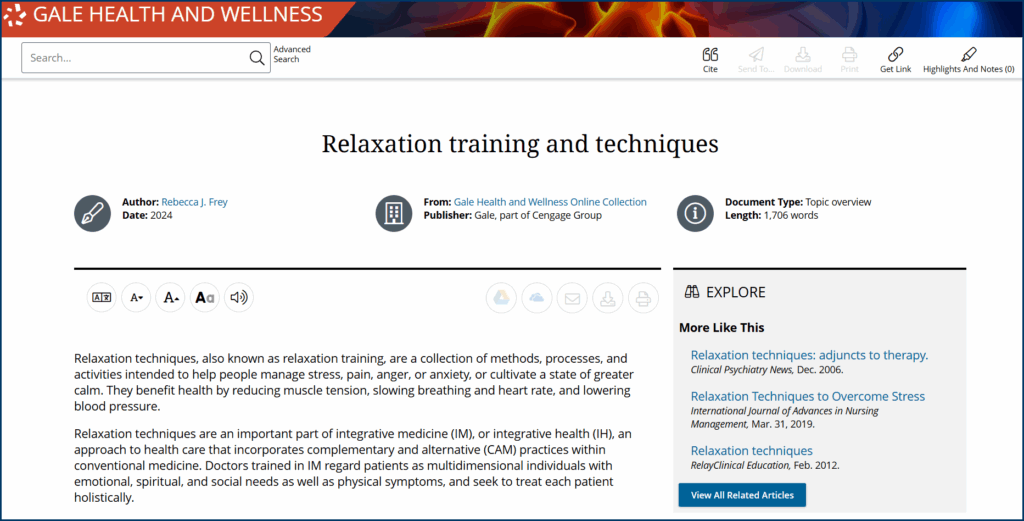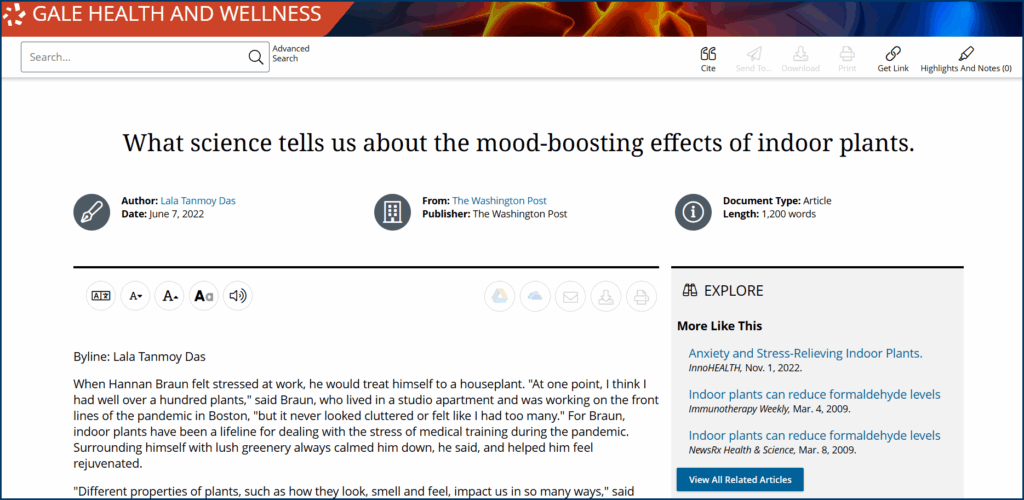Stress is meant to be temporary. The body reacts to a challenge with a surge of energy and focus, then settles back into balance once the challenge has passed. However, for one in two American adults who report living with chronic stress, it can seem like an endless cycle, where stress symptoms make everyday pressures even harder to manage.
Breaking that cycle starts with understanding what chronic stress does to the body and mind—and what can be done about it.
With Gale Health and Wellness, your library can make key information available to your community by providing access to medically reviewed resources that explain the science of stress and share evidence-based strategies for managing it.
Let’s take a look at how stress works as a biological function, key differences between short-term and chronic stress, and what steps can be taken to counteract negative impacts. Start with the Stress topic page!
The Biology of Stress
The stress response is an ancient survival system. For early humans, it often meant the difference between life and death. Rapid reactions that kept our species alive became hardwired into human biology, and have gotten passed down through generations.
Before we get started, let’s take a look at some key terminology:
Adrenaline: A hormone produced when experiencing stress or danger to increase heart rate, expand airways, boost blood flow to the muscles, and sharpen reaction times.
Amygdala: Brain region within the temporal lobe that rapidly judges perceptions—like sights or sounds—for emotional significance, particularly danger.
Cortisol: Stress hormone that regulates blood sugar, blood pressure, metabolism, and immune system response.
Hippocampus: Brain structure responsible for forming and organizing memories.
Hypothalamus: The “command center” of the brain that regulates automatic functions, including hunger, thirst, circadian cycles, body temperature, and more.
Prefrontal cortex: The part of the brain that handles complex decision-making, self-control, planning, attention span, and inhibitions.
Today, we experience the same biological stress response that early humans did. However, modern stressors are far more likely to be an unexpected bill or traffic jam than a carnivore on the prowl.
→ Reduce stress during your daily commute with these nine remedies
When the amygdala flags something as a potential danger, it triggers a rapid relay of signals that travel from the brain, through the endocrine system, to the body’s major organ systems. Here’s how that sequence works:
- The process begins in the amygdala, the part of the brain that processes emotions and scans for potential danger. When it perceives a threat, the amygdala activates the hypothalamus.
- Once the hypothalamus confirms that there is a stressor, the sympathetic nervous system takes over, so your body is prepared to act immediately. The adrenal glands release adrenaline, which pushes the heart to pump faster and the lungs to pull in more oxygen. Blood vessels constrict in the skin and digestive tract, redirecting circulation to the large muscles in the arms and legs needed for running or fighting. Pupils widen to sharpen vision, while sweat glands switch on to prevent overheating during the burst of effort.
- If the challenge isn’t resolved quickly, the hypothalamus recruits the pituitary gland and adrenal glands to activate the hypothalamic–pituitary–adrenal axis. This system releases cortisol, a hormone that keeps glucose circulating in the blood so muscles and the brain don’t run out of energy. Cortisol also helps maintain blood pressure, ensuring oxygen keeps moving where it’s needed most.
- To conserve resources, the body temporarily scales back activities it can postpone, such as digestion, production of reproductive hormones, and immune response.
In the short term, a surge of adrenaline and cortisol sharpens the senses and fuels quick, decisive action. Many people recognize this as the focused energy that helps them power through a workout or meet a deadline with only hours left to spare. Because the parasympathetic nervous system resets the body afterward, that momentary stress leaves them feeling confident and empowered, rather than drained.
The trouble comes when new stressors pile on before hormone levels return to baseline. Adrenaline keeps the heart racing and the muscles tense, while cortisol continues circulating glucose and suppressing systems the body deems non-essential.
Over time, those prolonged effects trigger a cascade of symptoms that lay the groundwork for chronic stress and the health problems that follow.
→ Help your community develop the skills to cope with and reduce chronic stress
The Health Impact of Chronic Stress
Stress is a systemic process, meaning that adrenaline and cortisol circulate throughout the body, impacting multiple organ systems at once. For this reason, stress fundamentally alters how the body works. Hormones designed for short-term survival keep pulling resources toward escaping some perceived danger and away from long-term repair, which puts harmful strain on your organs day after day.
Here’s what prolonged exposure to stress hormones can do to your health over time:
Cardiovascular Strain
A pounding heart and tight blood vessels are helpful in a sprint, but destructive if that’s how your cardiovascular system functions every day.
Stress hormones signal the small muscles in the vessel walls to contract, narrowing the passage to increase vascular pressure and deliver blood quickly to large muscles. However, chronic stress forces the vessels to stay in that constricted state. The heart then has to generate more force with every beat to push blood through the circulatory system.
The increase in blood pressure accelerates atherosclerosis—the gradual buildup of fatty deposits and scar tissue inside the arteries. This damage slows down blood flow and makes vessels less flexible, which increases the risk of heart attack and stroke.
More Frequent Illnesses
Cortisol dampens immune activity because, in an actual emergency, the body prioritizes immediate survival over repair. When those defenses stay suppressed, you become more prone to illness and infection due to a drop in white blood cells and antibody production. Many people under chronic stress notice that they catch nearly every cold going around, even if they were previously healthy.
→ Boost your immune system during stressful times by spending time in restorative natural spaces
Metabolic Disruption
Cortisol works with the liver to control the release of glucose into the bloodstream, ensuring muscles and the brain always have fast fuel when needed. Under chronic stress, the body continues releasing glucose. Over time, the cells stop responding efficiently to insulin, the hormone that normally allows glucose to enter muscle and fat cells. This condition, known as insulin resistance, is an early marker of prediabetes.
Instead of powering the body, much of that unused glucose remains in circulation or is stored as fat. The result is a mix of fatigue—because the cells aren’t getting the energy they need—and gradual weight gain. Without intervention, insulin resistance often progresses to type 2 diabetes.
→ Manage cravings and prevent stress eating with these mindful habits
Digestive Issues
When the stress response activates, the body pulls blood away from the stomach and intestines and slows the release of digestive enzymes, resulting in a spectrum of uncomfortable digestive conditions.
Some people develop bloating and constipation because reduced blood flow and enzyme activity slow the breakdown of food, leaving it in the intestines longer than usual. Others experience the opposite: stress speeds up muscle contractions in the gut, so food passes too quickly and causes cramping or diarrhea.
Stress also stimulates excess stomach acid, which irritates the esophagus and raises the risk of reflux or ulcers.
→ Learn how indoor plants can boost creativity and keep tension under control
Mental and Emotional Health Concerns
Stress hormones can actually “remodel” your brain, causing permanent structural changes that impact your mental and emotional health.
Memory Loss
The hippocampus is responsible for organizing and retrieving memory. Cortisol disrupts the way neurons communicate here, which makes it harder to hold onto new information or recall familiar details under pressure.
When exposure continues for months or years, the hippocampus can actually shrink in volume, leaving people with more persistent memory lapses.
→ Release tension by bringing more laughter into your day
Disorganization and Trouble Focusing
The prefrontal cortex regulates attention and problem-solving, but cortisol alters activity in this region, making sustained concentration difficult and leading to mistakes in planning or judgment. Over time, the imbalance tilts decision-making away from thoughtful control and toward reactive habits, which explains why people under chronic stress may feel less capable of organizing their lives even when they’re trying harder than ever.
→ Maximize yoga’s calming effects by selecting the right time of day for your practice
Mood Disorders
Unlike the hippocampus or prefrontal cortex, the amygdala becomes more active under stress. Cortisol primes it to detect threat more quickly, which may heighten vigilance in the short term but also leaves emotions running hotter than the situation demands.
If that heightened state becomes the norm, the brain begins to interpret even minor frustrations as potential dangers. Over the long term, this pattern can lead to mood disorders such as depression or anxiety and the exhaustion associated with burnout.
Poor or Interrupted Sleep
Stress hormones interfere with the body’s circadian rhythm by interrupting the daily cortisol cycle. Typically, it increases in the morning to promote alertness and decreases at night to allow deep, restorative sleep. When stress keeps cortisol elevated into the evening, the body never entirely shifts into that sleep-ready state.
People who try to sleep while under the effects of chronic stress may find that they lie awake or wake up repeatedly through the night. Adrenaline also plays a role, keeping the heart rate and breathing slightly elevated, as if the body is preparing for action even while in bed.
Over time, disrupted sleep becomes a self-reinforcing loop. Fatigue from poor rest makes daily challenges harder to handle, which triggers even more stress hormones at night. The longer this cycle continues, the more it contributes to serious conditions such as hypertension, obesity, and depression—all of which are linked to chronic sleep loss.
→ Return to sleep quickly using relaxation techniques for stress-related insomnia
Everyone experiences stress, but because short-term stress can be motivating, people often minimize or dismiss the signs of chronic strain, assuming they simply need to “tough it out.” Recognizing when professional support may be necessary is an important step toward protecting both mental and physical health.
Gale Health and Wellness empowers people to take control of their stress levels with medically reviewed resources that show the impact of stress across their entire body. With that knowledge, community members are better prepared to take stress seriously, work to reduce its impact, and seek appropriate care.
Equip your library with Gale’s collection of scientifically sound videos, articles, interviews, and more by reaching out to your local Gale sales representative.




